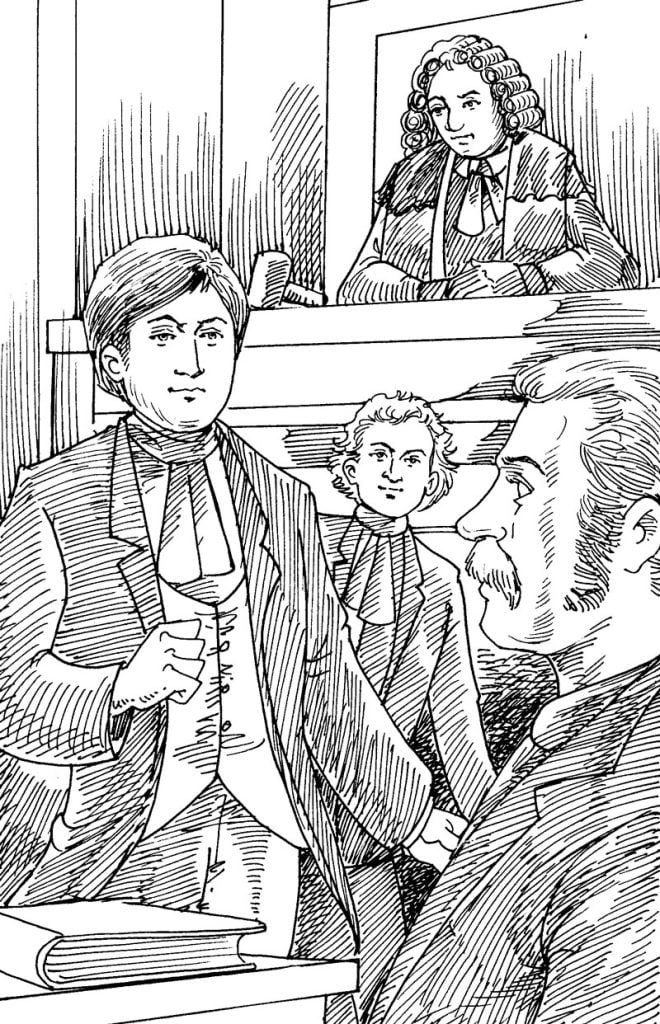Chapter-5
Five years had passed. It was 1780. Dr. Manette and his daughter lived in a comfortable house in London. The doctor had regained his health and returned to practicing medicine. Mr. Lorry still worked for Tellson’s Bank and continued to travel between its London and Paris offices. England had been at war with her American colonies for five years, but was losing battle after battle. France had come to the aid of the colonists, an act which angered England.
It was because of these bitter feelings that a trial for treason was in progress at the Old Bailey Courthouse in London. The accused, Charles Darnay, was charged with passing government secrets to the French king about the troops England was sending to North America during the Revolution.

The man standing quietly but confidently in the prisoner’s box was a tall, handsome, darkhaired gentleman of about twenty-five. From time to time, Charles Darnay’s eyes were drawn to two witnesses sitting in the courtroom. They were Dr. Alexandre Manette and his daughter Lucie, whom Charles had met during their trip to England five years before, when Lucie was taking her poor, ailing father out of France. Because of this meeting, they were being called to testify against the prisoner, as was Mr. Jarvis Lorry, who had accompanied them on that trip.
The solicitor or attorney for the British Government told the jury that he planned to prove that Darnay’ s treason had started five years ago, on the eve of the Revolution. The prisoner’s lawyers, Mr. Stryver and Mr. Carton, sat at a long table, Stryver listening intently to the government’s solicitor and Carton staring fixedly at the ceiling.
The first witness to be called by the solicitor was Mr. John Barsad, a gentleman and former friend of Charles Darnay.
“Why are you testifying against the prisoner?” began the solicitor.
“Because I discovered his treacherous schemes, sir, and being a patriot, I reported them to the government immediately.”
“And what were these treacherous schemes?”
“He was supplying the French with lists, in his very own handwriting, of British troop movements to the colonies.”
When it was Mr. Stryver’s turn to cross examine Barsad, he showed that far from being a gentleman, Barsad was an ex-convict and a gambler, and far from being Darnay’s friend, had only met him once, in a coach.
The solicitor then called Roger Cly, Darnay’s servant, as the next witness. “How long have you worked for the prisoner?” began the solicitor.
“About four years,” replied Cly.
“Have you ever seen the prisoner with papers listing the troops and military equipment that England was sending to North America?”
“Yes, I did.”
“Where?”
“In Mr. Darnay’s pockets and in his desk.”
“And did you ever see him give those papers to anyone else?”
“Yes, to some French gentleman on the boat that travels between Dover and Calais.”
“What do you expect to gain by giving this evidence against the prisoner?”
“Nothing whatsoever. I am doing it for the love of my country. I am a true Englishman.”
Under cross-examination by Stryver, Cly admitted to having been a thief and working at one time for the French Government.
The solicitor next called Mr. Jarvis Lorry to the witness stand. “Think back five years, Mr. Lorry, to a certain Friday night in November, 1775,” he began, “Were you then travelling on business from London to Dover by mail coach?”
“I was,” replied the banker.
“Were there any other passengers in the coach?”
“Yes, two men.”
“Did those two men leave the coach in the middle of the night and continue on the road by foot?”
“They did.”
“Was the prisoner, Charles Darnay, one of them?”
“I really don’t know, sir,” replied Mr. Lorry, looking at Darnay, “They were so covered up and the night was so dark that I couldn’t really see them well enough to identify them.”
“Have you ever seen the prisoner before. Mr. Lorry?”
“Yes, when I was returning from France a few days after that. Mr. Darnay was on the same boat that brought me back to England.”
“At what time did he come aboard at Calais?”
“A little after midnight.”
“Were you travelling alone, Mr. Lorry?”
“No, sir. I was with two companions, Dr. Alexandre Manette and his daughter Lucie.”
“And did you speak to the prisoner during that trip?”
“No, it was a stormy night and I spent the entire trip in my cabin.”
“Thank you, Mr. Lorry,” said the solicitor.
“That will be all. You may step down. I now call upon Miss Lucie Manette to testify.”
The young lady approached the witness stand slowly, looking with great pity at Charles Darnay.
“Miss Manette, when did you first meet the prisoner?” asked the solicitor.
“On the boat Mr. Lorry just referred to. I had made a bed for my father on the deck because he was very tired and weak, and I wanted to give him some fresh air. Mr. Darnay came over and suggested how I could better protect my father from the wind and cold. He was very kind and gentle towards my father, and I was most grateful to him.”
“Did the prisoner come on the boat alone?”
“Did the prisoner come on the boat alone?”
“What were they doing while on board?”
“They were looking at some papers and whispering.”
“What kind of papers were they looking at?”
“I don’t know.”
“Did the prisoner mention to you anything about his business?”
Lucie looked at Charles Darnay and started to sob. Then, turning back to the solicitor, she said, “Mr. Darnay was so kind to my father that I hope I won’t do him any harm today.”

